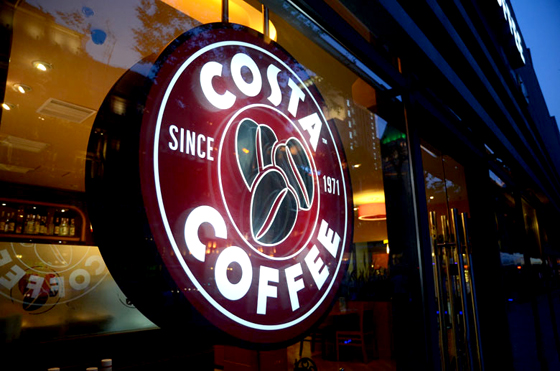"always in second place" COSTA bet on the full capitalization of the Chinese market in an attempt to check and balance with Starbucks

For professional baristas, please follow the coffee workshop (Wechat official account cafe_style)
After Starbucks implemented wholly-owned direct operation in the Chinese market, COSTA also put wholly-owned enterprises on the agenda. In the latest news, Whitbread Group, the parent company of British coffee brand COSTA, announced the acquisition of the remaining 49 per cent stake in Yueda Ka Shijia (Shanghai) Restaurant Management Co., Ltd. (hereinafter referred to as "Yueda Ka Shijia") for 310 million yuan. The company is a joint venture between COSTA and Jiangsu Yueda Group (hereinafter referred to as "Yueda Group"). Upon completion of the acquisition, COSTA will wholly own the southern Chinese market. In fact, compared with its competitors, COSTA has been developing slowly in China in recent years, and this acquisition is widely believed to be aimed at accelerating the layout of the Chinese market. But at present, the competition in the domestic coffee market has become white-hot. In addition to Starbucks and other coffee brands, fast-food brands such as McDonald's and KFC are also ambitious in this field. Under the "internal and external attack", it is difficult for COSTA to increase speed in China.
Lag behind Starbucks again
COSTA entering China in the form of joint venture is beginning a new round of strategic layout. According to the news released by the Whitbread Group, after investing 310 million yuan to acquire the remaining 49% stake in Yuedaga Shijia, COSTA will complete the integration of the southern market and all the stores will be owned by COSTA, while the cooperation mode of COSTA Northern Market and Beijing Hualian Group will not change at present.
In response, Whitbread Group CEO AlisonBrittain said that China's coffee shop market has great potential, the pursuit of international development is one of COSTA's three main strategies, this acquisition decision will enable COSTA to enhance strategic and financial flexibility.
In fact, judging from the development of COSTA in recent years, the company surpassed Starbucks in market share in the UK in 2010, but the expansion of overseas stores is very slow. According to public information, COSTA has 420 stores in mainland China. By the end of 2016, Starbucks had more than 2400 stores in mainland China.
In addition to the number of stores, COSTA is considered to be a "follower" of Starbucks in terms of location, and COSTA stores are mostly near Starbucks stores, hoping to attract customers by facing competition. But on the other hand, as a foreign coffee brand, Starbucks began to diversify its business after entering the Chinese market. In addition to coffee, cups and other products, Starbucks also sold zongzi and moon cakes according to traditional Chinese festivals, constantly testing new products and ideas. COSTA is weak in this respect, not only not as rich as its competitors, but also with little marketing efforts.
In July this year, Starbucks Coffee announced that it would acquire the remaining 50 per cent of Starbucks Coffee Co., Ltd., a joint venture in Starbucks' East China market, for about US $1.3 billion in cash. Starbucks will achieve full direct management of the mainland market after the acquisition. And COSTA once again lags behind Starbucks in its wholly-owned operation.
According to public information, after COSTA Coffee entered the Chinese market in 2006, it established cooperation with Yueda Group and Beijing Hualian Group to set up joint ventures Yueda Kashijia and Hualian Kashijia to be responsible for the operation of the southern and northern markets of COSTA Coffee respectively. At present, COSTA operates more than 3000 stores worldwide and has 420 stores in China, including 252 in the southern market and 168 in the northern market, together with partner Beijing Hualian Group.
Chinese food industry experts believe that Starbucks is better than COSTA in the spread of coffee culture. From the perspective of the joint venture behind the two brands, Uni-President Group, which cooperates with Starbucks, is more familiar with the Chinese market environment, while Jiangsu Yueda Group is not superior in terms of market response and expertise, which is probably one of the reasons for the slow development of COSTA in China.
In this regard, the relevant person in charge of COSTA China Southern Market said in an interview with Beijing Business Daily that COSTA has different management methods in China's southern market and northern market, and it is impossible to disclose more information about the future development of COSTA.
Competition among the three major coffee shop brands
It is generally believed that China's coffee industry is facing a new round of reshuffle. According to Meituan Dianping's public data, after the number of cafes in China exceeded 100000 at the beginning of 2016, the number of cafes in China showed a downward trend, from 105157 at the beginning of the year to 90943 at the end of 2016. Especially in the first-tier city market, which accounts for 15.7% of the total number of cafes in the country, the market space has become saturated, so the major brands pay more and more attention to the development of the market in third-and fourth-tier cities.
In terms of market layout, according to the data released by Starbucks on its official website, Starbucks has opened 2800 stores in 130 cities in China, and a large number of new stores opened in the past two years are located in non-provincial capitals. It has covered all provinces, cities and autonomous regions except Xinjiang and Xizang. As a latecomer, Pacific Ocean (601099) Coffee is also expanding rapidly. according to a query on the official Wechat, it has now covered 24 provinces, municipalities and autonomous regions and opened 312 stores. While the store coverage of COSTA is still limited to first-and second-tier cities, especially in the western region, there are a lot of gaps.
An equally noteworthy set of data shows that the COSTA parent company's acquisition of 49 per cent of the 252 stores in Yueda's southern market joint venture cost only 310 million yuan. At that time, Starbucks spent nearly 8.8 billion yuan to buy 50% of the 1300 restaurants owned by Uni-President, nearly 6.8 million yuan for a single store, and just over 1.2 million yuan for a single COSTA store.
In terms of price, there are also slight differences in product prices between COSTA and Starbucks and Pacific Coffee. Take American coffee and latte which are common in the market as an example, the cup shape and brewing methods of the three cafes are different, so the price is also different. COSTA's American coffee price range is 22-28 yuan, latte price range is 28-34 yuan; Starbucks American coffee price range is similar to COSTA, 22-28 yuan, latte price range is 27-33 yuan; Pacific Coffee American coffee product price range is 22-28 yuan, latte price range is 27-33 yuan.
Not only that, in Meituan Dianping's online hot ranking of coffee brands, COSTA is also out of the top 10, lagging far behind not only competitors such as Starbucks and Pacific Coffee, but even Korean brands such as Zoo Coffee and Man Coffee. Perhaps aware of the shortcomings in innovation, COSTA has recently opened two programmer-themed cafes in Hangzhou, especially for stores in Alibaba Park, but whether it can catch the Internet Express to boost its popularity remains to be tested.
Pressure from external enemies
In addition to competitors in the industry, fast food giants are also something to be reckoned with. According to relevant data, China is one of the countries with the fastest growth in coffee consumption in the world. At present, the consumption of coffee in China is about 200 billion yuan. Consumption is growing at an annual rate of 25%, while the world's coffee consumption is growing at an average rate of 2.5%. In the face of the huge market dividend, many enterprises are optimistic about the development prospect of China's coffee industry.
McDonald's earlier launched its coffee brand McCoffee, which aims to generate more revenue, traffic and competition with coffee brands such as Starbucks, a move that also brings McDonald's high profits. Data show that McCoffee alone brings $4 billion in sales to McDonald's every year.
KFC, also a fast-food brand, began selling freshly ground coffee in 2015. KFC set the price of its freshly ground coffee at 10 yuan, staggering the price of 20 yuan for McCoffee, its main competitor in the coffee market, and 30 yuan for Starbucks. Based on more than 5000 stores, KFC Coffee has undoubtedly become the largest chain brand in the Chinese coffee market. It is worth noting that this year KFC Grinding Cafe has separately landed on the third-party takeout platform, which also brings challenges to offline coffee brands.
Industry experts believe that the wholly-owned operation of COSTA Southern Market will play a positive role in the supply chain, operation and market response, and can strengthen COSTA's evaluation of the market and the formulation of medium-and long-term strategies. However, according to the competition of the whole coffee market at present, COSTA is facing the front and back attack, and the development of the coffee market will face great challenges in the future.
Some analysts also pointed out that, different from Starbucks' standardized automatic coffee production process, COSTA needs a lot of manpower to control the preparation and taste of coffee, and the time cost and labor cost are more than competitors, which also hinders the expansion of COSTA to a certain extent. How to improve efficiency and improve brand stickiness in the future is the problem that this brand should solve.
Important Notice :
前街咖啡 FrontStreet Coffee has moved to new addredd:
FrontStreet Coffee Address: 315,Donghua East Road,GuangZhou
Tel:020 38364473
- Prev

Does a single cup of coffee raise cholesterol? No, I'll teach you a way to solve it easily!
Professional baristas Communication Please pay attention to Coffee Workshop (official Wechat account cafe_style) drinking coffee has many benefits, but it also has unhealthy aspects, which can lead to an increase in blood lipids. The main reason is that coffee contains coffee oil, in which the diterpenes compounds caffeine (cafestol) and caffeinol (kahweol) make triglycerides and triglycerides in the blood
- Next

Want to burn fat and want to lose weight? In addition to lemonade and coffee, these five drinks are also fine.
Professional barista communication Please follow what would you like to drink when you lose weight in the coffee workshop (Wechat official account cafe_style)? Many people think that lemonade is the only weight loss drink. In fact, there are several drinks in exercise and healthy work and rest, can also play the effect of accelerating fat burning. Many people who are losing weight use lemonade as an indispensable daily drink. In fact, there is no one.
Related
- Can I make coffee a second time in an Italian hand-brewed mocha pot? Why can't coffee be brewed several times like tea leaves?
- Hand-brewed coffee flows with a knife and a tornado. How to brew it? What is the proportion of grinding water and water temperature divided into?
- What is the difference between Indonesian Sumatra Mantinin coffee and gold Mantinin? How to distinguish between real and fake golden Mantelin coffee?
- What does bypass mean in coffee? Why can hand-brewed coffee and water make it better?
- Unexpected! Ruixing Telunsu lattes use a smoothie machine to foam milk?!
- % Arabia's first store in Henan opens into the village?! Netizen: Thought it was P's
- Does an authentic standard mocha coffee recipe use chocolate sauce or powder? Mocha Latte/Dirty Coffee/Salty Mocha Coffee Recipe Share!
- What is the difference between Vietnam egg coffee and Norway egg coffee? Hand-brewed single product coffee filter paper filter cloth filter flat solution!
- What is the difference between sun-cured and honey-treated coffee? What are the differences in the flavor characteristics of sun-honey coffee?
- How to make Italian latte! How much milk does a standard latte use/what should the ratio of coffee to milk be?

